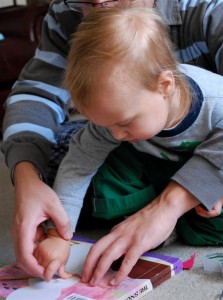Baby knows best. Really. They are perhaps not scholars just yet but they do know what they need better than any of us and well, we should listen to them . . . and if we did they would probably say . . . that doing the “right” thing is never easy.
Like when you were a kid and were forced to apologize and admit error–it was the “right” thing to do, but it was so hard to say that you were wrong. Or, choosing to skip a party in order to study instead of cheating on a final exam in high school. Studying was hard work, but it was “right,” right?
I’ve come to the conclusion, or even grand epiphany perhaps, that doing the “right” thing as a parent is also not the easier choice. I came to this conclusion after struggling once again following sleepless nights and clingy days with the attachment parenting philosophy that we have adopted as parents. The attachment parenting tenets are simple really and were so appealing to us initially because they essentially support the beliefs that we already held about parenting. To us, AP Principles just seem like no-brainers: go to your child when he cries–he needs you, breastfeed your baby–it’s food that’s literally made for him, sleep with your child–because you are a parent at night too, use positive discipline to teach your child–negativity punishes, hold and wear your baby–it fosters bonding and security, etc.
Even rereading these as I type them, I find myself nodding in agreement–unable to imagine parenting any other way. But problems arise for this gentle parenting scenario not from any inherent flaws in a plan that seeks to parent gently and respectfully, but from other parents who have found an “easier” way. See, this kind of parenting requires a mom and dad who are fully committed to sacrificing much of their own needs for that of their baby’s. In other words, it takes dedication and patience–a lot, a lot of patience–and a great deal of self-sacrifice.
I am specifically talking about the issue of nighttime sleeping. Fewer issues get as much airtime during playdates, mommy groups, or any other gathering of moms and babies–it’s simply at the heart of every discussion. Exhausted, delirious and desperate mommies eagerly compare notes and exchange sleep tricks in search of something that will help them get more sleep. And, no matter how you try and spin it or how much you try to avoid the inevitable final conclusion, the sleep issue comes down to two dismal options: “sleep training” your baby, or not.
Sleep training methods vary greatly from one to another, but the one thing that they all have in common is that they all include some degree of crying. I have written much about my feelings as they pertain to “crying it out” and though the first was many sleepless months ago, I still do have a problem with my baby crying–yes, I’ve said it, I do not let my baby cry without intervening in an effort to alleviate the cause whatever that cause may be. Why? Because I believe that my son is communicating with us when he is crying–I do not believe that babies cry just to cry, in other words. Sometime this communication may be asking for basic needs to be met and other times it may just be a way to ask for a hug, a cuddle, or a kiss. But, you see, one does not surpass the other in importance for me. My baby’s need to be touched is just as importance as his need to be fed or changed. I will respond in either case and at any time. And that is where myself and my husband diverge from the parents who try to sell us the success of sleep training and tout the amount of sleep that it has brought them. But, at what cost, I want to ask them.
I believe family bed advocates when they claim that co-sleeping raises independent, confident and secure children–I also believe that leaving your baby to fend for them self during these times of nighttime need may produce children who are more dependent, anxious and insecure. I also know that these one or two or three years dealing with his sleeplessness as a baby is small in scale when compared to the number of years that we won’t have to. I will be old and he will no longer by my baby–I will look back on these years with a tender heart yearning for the moments when I was able to hold him in my arms to return.
I do, however, from time to time grow weak–very weak. I do whine and fuss and complain about exhaustion and the need for a moment to myself. During these times I do momentarily wonder if we should not also “train” Noah to self soothe, to sleep alone, to quiet his need for love, comfort and affection just because it is the moon, not the sun, that has risen above the horizon. Those parents are convincing and proud. They’re confident and I suppose, maybe even some look rested.
But, then I give it a second thought. I listen to my heart and am reminded of why I have chosen the more challenging path. When I grow weak and weary, I turn a listening ear to my instinct, my mama gut–and find that I know deep down in my heart that parenting this way, for me, is the “right” way to parent. And, like all things that are “right” it is most certainly the more difficult choice–it may continue to be for a while still to come. But . . . doing the “right” thing is never easy, right?
 Let’s be honest: toddlers and young preschoolers can wear on even the most patient person’s nerves. From the constant questions (“why?” “wat dat?” “where mama go?”) to the wild mood swings and outbursts, life with one to three year old kids can be difficult. But screaming back at your angry two year old is not going to help him learn how to handle his difficult emotions. Telling your heartbroken three year old to stop crying and “get over it” after she spills her ice cream is not going to make her feel better about the ice cream or herself. Smacking your twenty month old’s hand for pulling the cat’s tail does not teach him how to give gentle touches.
Let’s be honest: toddlers and young preschoolers can wear on even the most patient person’s nerves. From the constant questions (“why?” “wat dat?” “where mama go?”) to the wild mood swings and outbursts, life with one to three year old kids can be difficult. But screaming back at your angry two year old is not going to help him learn how to handle his difficult emotions. Telling your heartbroken three year old to stop crying and “get over it” after she spills her ice cream is not going to make her feel better about the ice cream or herself. Smacking your twenty month old’s hand for pulling the cat’s tail does not teach him how to give gentle touches.
 important they are to you. Give them affection without limit, without reservations, and without excuse. Pay as much attention to them as you can, regardless of mood or circumstance. Let them know you’re delighted to be with them, that you care about them no matter what happens. This basic posture is completely different from praise, which is doled out as a response to something a child does.
important they are to you. Give them affection without limit, without reservations, and without excuse. Pay as much attention to them as you can, regardless of mood or circumstance. Let them know you’re delighted to be with them, that you care about them no matter what happens. This basic posture is completely different from praise, which is doled out as a response to something a child does.

